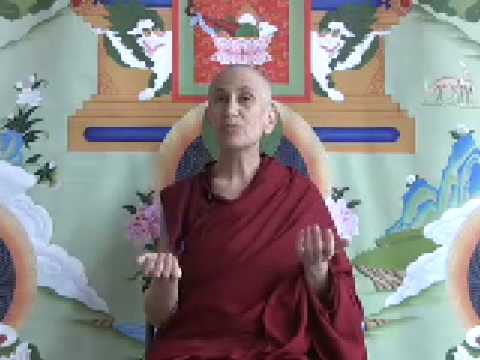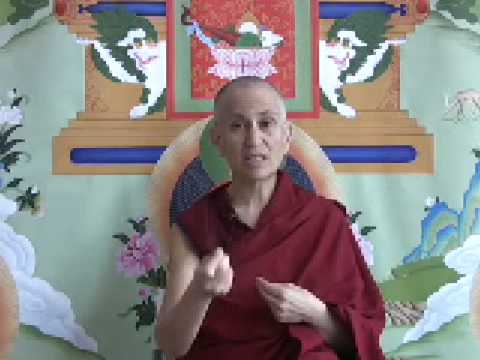Verse 34-4: How we repay others’ kindness
Part of a series of talks on the 41 Prayers to Cultivate Bodhicitta from the Avatamsaka Sutra (the Flower Ornament Sutra).
- Training our minds to see others’ kindness
- Looking at the various ways people are kind to us
- Choosing how we repay the kindness of others
41 Prayers to cultivate bodhicitta: Verse 34-4 (download)
“May all beings be unkind to wrong views.”
This is the prayer of the bodhisattva when seeing someone not repaying kindness.
How do we repay the kindness of other beings to us? We’ve talked about how we expect them to repay our kindness and how we feel when we see others repaying kindness, or when we don’t see them repaying kindness, but the real thing is: what about me? Have I trained my mind to see the kindness of others? Seeing their kindness, do I reciprocate, do I repay their kindness? This is a very important thing.
So often we are self-centered: “What are they doing for me?” To really have it in my mind, “Who has been kind to me? How do I treat that person who has been kind to me?” Here of course we could start with obvious acts of kindness, the people who give us presents, or who praise us. Then there are so many people who do so many things for us that aren’t like that—that are big things, but they are big things in another way. In other words, if they didn’t do them, we would have a lot of suffering.
For example, a lot of times when we are working together with people on a project, we usually think of what they are not doing that we have to take over. Do we look and see what they are doing and appreciate that? Do we repay their kindness for doing that? Or when we need help, do we appreciate the people who come to our aid or do we just take it for granted that they should? Do we appreciate the people who teach us things or do we just again take it for granted and assume that it should be there?
So often as we go through our life we are continually experiencing the kindness of others but do we train our self to be aware of it and then to act and reciprocate in one way or another? The question comes up, “How do we reciprocate?”
I remember when Jeffrey Hopkins was in Seattle he was talking about how it’s important that we choose how to reciprocate the kindness of others. Others may have their ideas of what they want us to do and then we may say, “if I do that, that’s repaying their kindness.” Very often in the process of doing that, we may create some non-virtue. We may waste a lot of time because maybe the person doesn’t know anything about the Buddhadharma and the way they want us to reciprocate their kindness—and of course we want to reciprocate—is they want us to come and do this and that and the other thing for them and live our life in a certain way. Or spend our time in a certain way. Or earn a certain amount of money, or whatever. And we might say, “Well they have been very kind and this is what I should do to reciprocate their kindness.” Then in doing that, we have no time for Dharma practice and we may get involved in mental states with attachment, and anger, and confusion, and do destructive karma, and so on. All in the name of repaying the kindness of somebody.
That’s why it’s very important that we choose the way in which we repay the kindness. This is where Dharma practice comes in, and why we shouldn’t see it as my Dharma practice that I’m doing for my spiritual advancement. Rather, it’s something that we are doing to repay the kindness of others, because as we mature spiritually we become more and more capable in this life—and especially in future lives—of being of greater and greater benefit to others. We want to choose that way of repaying the kindness.
It doesn’t mean that we never do what anybody wants us to do. I am not saying that. I always have to qualify things, because if I don’t then people go to the other extreme. That’s why I am not saying that. But what I am saying is, don’t think that repaying others kindness means doing everything they want us to do. Rather, with our wisdom and with having the Buddhist worldview, and knowing about karma in past and future lives, then we choose what we think is the best way to repay the kindness, even though that repaying may not come immediately. Similarly, even though we may not be able to repay somebody in this life in the way they would like, we may be able to do active actions for other people who are more receptive. That’s the whole idea of paying it forward. This is something really to think about. If we do it, it clarifies many many things in our minds.
Venerable Thubten Chodron
Venerable Chodron emphasizes the practical application of Buddha’s teachings in our daily lives and is especially skilled at explaining them in ways easily understood and practiced by Westerners. She is well known for her warm, humorous, and lucid teachings. She was ordained as a Buddhist nun in 1977 by Kyabje Ling Rinpoche in Dharamsala, India, and in 1986 she received bhikshuni (full) ordination in Taiwan. Read her full bio.


